May 19, 2025 | 21:51 GMT +7
May 19, 2025 | 21:51 GMT +7
Hotline: 0913.378.918
May 19, 2025 | 21:51 GMT +7
Hotline: 0913.378.918
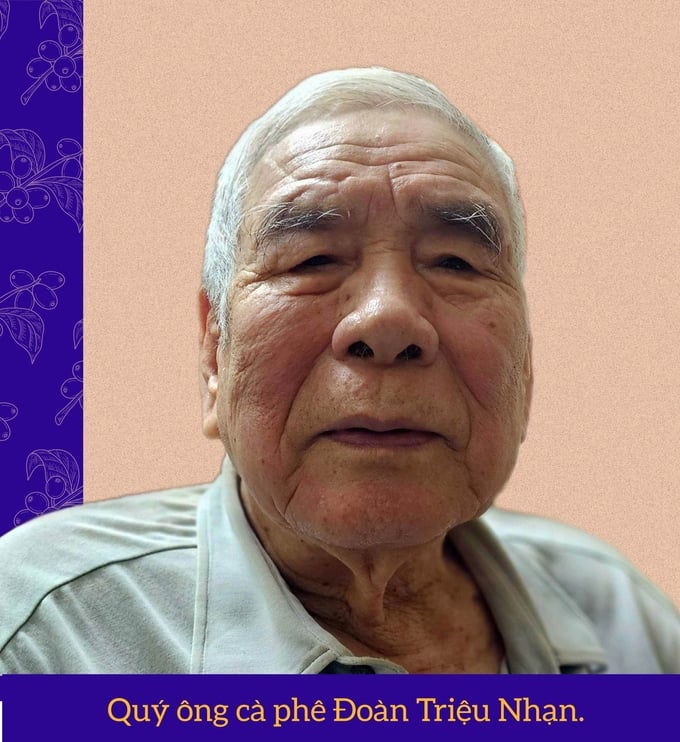
Nested in an old apartment on Hoang Ngoc Phach Street, Hanoi City, the venerable figure, who has just surpassed the age of 90, received me. He slightly stooped, moving with measured steps. He clutched a walking stick with deliberate movements. Yet, despite the languid pace of his gait, his eyes gleamed with a sharpness that belied his age, and his mind remained a bastion of clarity amidst the fog of passing decades. He was enthusiastic and sharp, especially when we delved into the topic of coffee.
He raised his eyes to the title "Labor Hero," thanks to his outstanding achievements during the Reform period. Alongside those titles were the Second-Class and Third-Class Labor Medals, earned for outstanding contributions to developing the coffee industry. There were countless other commendations and certificates, highlighting the remarkable features of a life that has dedicated itself entirely to coffee.
However, my attention was drawn to a black-and-white picture capturing the cover of a magazine publication. It was encased in a glass frame and hung in a dignified place in the room. The picture frame seemed to have aged with time, much like its very owner.
It is the article published in Tea and Coffee Trade Journal Magazine in December 1999. It seems that the editors spent most of the article honoring Mr. Doan Trieu Nhan, one out of three personalities of the year as voted. The headline of the issue was “Mr. Coffee – Doan Trieu Nhan – Hanoi, Vietnam – Who can doubt Mr. Coffee?”. His name Nhan, is pinned right on the cover. The following articles focus on analyzing why on a global coffee forum, whenever Vietnamese coffee is mentioned, it is associated with 'Mr. Doan Trieu Nhan'
Certainly, here's the excerpt: “In the international coffee community, Doan Trieu Nhan is known by the nickname 'Mr. Coffee' of Vietnam and is recognized as the person who put Vietnamese coffee on the world map. He has been present since the early days of Vietnamese coffee and has been on a journey to make Vietnam one of the coffee-exporting powerhouses. Mr. Coffee is also a frequent speaker at international forums, leading the way in gaining global acceptance for Vietnamese coffee. Having served as the CEO of Vinacafe, the largest coffee exporter in the country, and later as the Chairman of the Vietnam Coffee and Cocoa Association, Mr. Nhan's influence seems to be everywhere in the coffee business in Vietnam and many countries around the world," summarized the Tea and Coffee trade journal about him.
I started the conversation with “Mr. Coffee” from his honor 25 years ago, Mr. Nhan smiled gently, explaining that it was all to fate. He poured a cup of Arabia, the tea coffee grown on the top highland of the Northwest region. Our generation did not have any choices. Mostly depends on the allocation from the organizations, the career chose us then we work it for life, just like this cup of coffee, willing to devote its quintence to life.
“The generation” as mentioned by Mr. Nhan, is the students who grew up in the war resistance area, and were selected to be sent for abroad education at South China Agricultural University (China). The total was 14 students including Mr. Doan Trieu Nhan and Mr. Nguyen Cong Tan, who then served as Minister of Agriculture and Rural Development and Governmental Deputy Minister. A generation that saw everyone go for the same, willing to receive all missions, ready to go, as long as the organization needed it and the work was beneficial to the country. And the Mr. Coffee was no different. After completing his studies and returning, he was initially assigned to work at the Tropical Plant Research Institute in Phu Quy, then the Crop Cultivation Department, and the Soil and Fertilizer Institute before 'coffee chose him’ around the 1980s.
That was the time when the Coffee-Cacoa Company of the Ministry of Agriculture was newly formed, with a mission to expand the cultivation area to cooperate with the Soviet Union and other socialist countries. However, not many people understood the French plant species introduced to Vietnam in the early years of the century. Even the group of students returning from China was mainly trained in soil science, crop cultivation, and rice, with hardly anyone learning about coffee. A beginning couldn't have been more difficult.
In April, 1980, Mr. Nhan who was worked as the Vice Dean of the Soils and Fertilizers Institute called by MARD Minister Nguyen Ngoc Triu. The latter told him to try planting coffee. At first, it seemed like a mistake, but just a few days later, they had to pack up and head from Phu Quy (Nghe An) to Nha Trang (Khanh Hoa) - the initial bases of the Coffee-Cocoa Company, assuming leadership roles. With no salary or operating funds, somehow those individuals from the beginning managed to travel throughout the Central Highlands, establishing four state-owned farms and one supply station in Nha Trang, turning the Eakmat Agricultural Research Center into a Coffee Research Institute, etc.
By the end of 1980, Minister Nguyen Ngoc Triu and Deputy Minister Nguyen Cong Tan were able to organize a conference on the coffee development program in Nha Trang under the direct guidance of Deputy Prime Minister Vo Chi Cong. Mr. Doan Trieu Nhan, who just a few months earlier didn't know much about coffee, presented a coffee development program covering 180,000 hectares, with a production of over 200,000 tons. Almost immediately, Mr. Vo Chi Cong agreed and directed the relocation of the company headquarters to Dak Lak. Just a few days later, the Coffee-Cocoa Company of the Ministry of Agriculture set foot in the Central Highlands, in a dilapidated former barracks left behind by the defunct regime.
The chairman Doan Trieu Nhan was the very founder of the first 5-year plannong of the Vietnamese coffee. Accordingly, the planning quota for the period of 1980-1985 was a new plantation of 40,000 ha of coffee. Building cooperation program and sign the Vietnam -German Coffee Cooperation Agreement, etc. Mr. Nhan became the Director-general of the most robust Coffee Association of the Central Highlands at that time. Right then, it was the “revolutions” that the 90-year-old- coffee man still vividly on his mind.
Firstly, the People’s Coffee Conference was held to scale up the coffee cultivation movement. A peak in family coffee planting quickly expanded, bringing the area to over 100,000 hectares and then 200,000 hectares. Coffee exports also surged from 3-40,000 tons to over 100,000 tons in a short period.
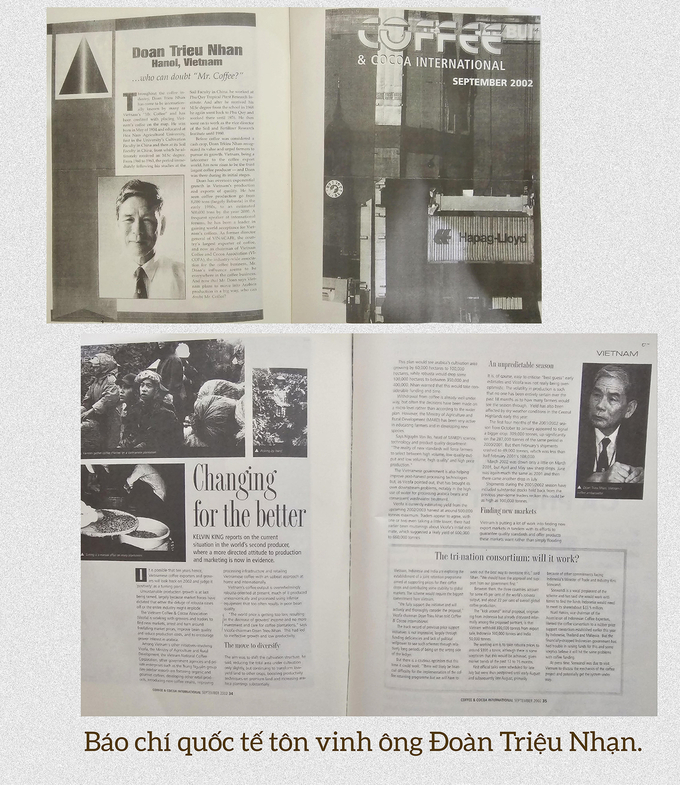
At the end of 1989 to the beginning of 1990, the Vietnam Coffee-Cocoa Association was established and held a congress. Mr. Doan Trieu Nhan, the General Director of the Federation of Vietnamese Coffee Enterprises, was elected as the first Chairman. During that time, Vietnam applied to join the International Coffee Organization (ICO), and Mr. Nhan was one of the members sent to London to persuade the international council. By early 1991, Vietnam was officially recognized as a member of the ICO. Direct coffee exports and the establishment of export inspection companies marked the beginning of a new chapter for the Vietnamese coffee industry.
In the 1990s, the Coffee Enterprise Association entered the struggling years, requiring reformation of business operation. At that time, mostly agreements expired as Soviet Union an East European Communist countries encountered a series of fluctuations. In the Vietnamese coffee industry, the subsidy administrative management style and centralized planning were abolished. Farmers had to navigate the economic currents themselves. Initially, they struggled to adapt, with farms lacking fertilizers and proper care due to the absence of funding, leading to severe degradation.
The decree "Change or Die" under the substitution of quota regime was immediately implemented. Workers received quotas for their farms and took on the responsibility of investment themselves, resulting in significant changes in production. "The Minister and I visited a coffee plantation in Ia Sao (Gia Lai), where citizen families took care of their plantations, even bringing their own livestock manure to fertilize the coffee trees. The quality of the Federation's coffee plantations improved significantly, with increased productivity. With the abolition of quotas, replaced by the self-motivated labor of the workers who now owned their farms, the power of the working class here transformed the landscape of production. Family coffee plantations were also well tended by farmers. The entire coffee industry entered a new era of development," Mr. Nhan recalled.
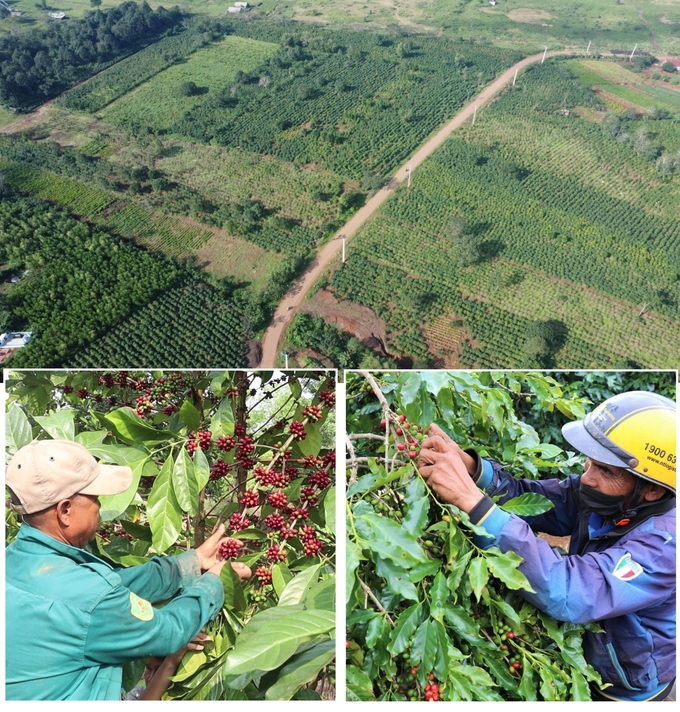
In "Mr. Coffee's memories, the challenging years were also the most wonderful period. The remarkable achievements of a generation are evident in their ability to clear land, construct reservoirs, and cultivate coffee crops... Green hills swiftly took the place of wild forests. It's a remarkable achievement that the coffee region is overseen by the Federation, covering the provinces of Gia Lai, Kon Tum, and Dak Lak. Residential areas, towns, and even urban areas have flourished, inspired by the success of coffee growers.
Ea Knop town is well-known for being the headquarters of Battalion 333. In this location, bustling hospital and vibrant streets surround a statue of a soldier, proudly clutching a rifle and a branch of coffee. The village-town 719 is an impressive address, where the soldiers of Battalion 719 dedicated themselves to creating a residential area complete with rows of houses, paved roads, and high-pressure streetlights on both sides. As we return to Buon Ma Thuot, the transformation along the road from the airport to the city is remarkable. What was once a deserted area now buzzes with activity, with bustling streets, new schools for children, and luxurious houses that have sprung up thanks to the impressive growth of the Vietnam-Germany Coffee Federation.
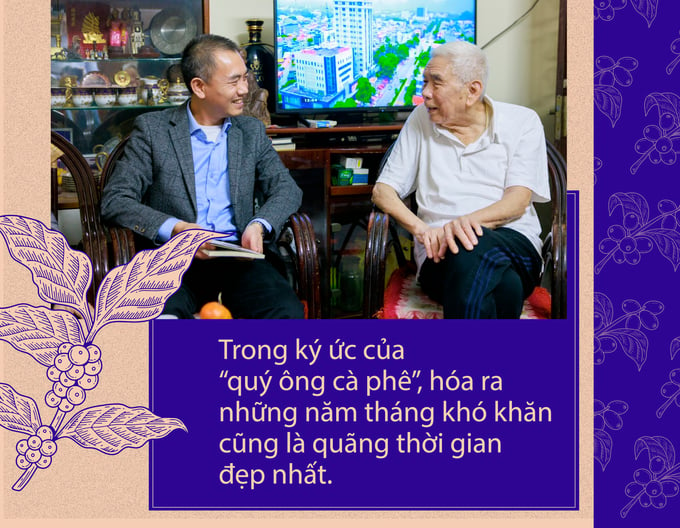
The onced rough and rugged road leading to the Eakmat Coffee Research Institute, turns smooth now as it was paved, lined with newly built houses for coffee workers. Passing through the area of expert residences, which once housed experts from countries like the Soviet Union, the German Democratic Republic, as part of coffee cooperation programs, and a group of experts from the United Nations Development Organization, including Dr. Walyero, responsible for coffee breeding genetics at the Ruiru Coffee Research Institute in Kenya. All of this is thanks to the collective efforts of coffee industry workers, including soldiers from the 3 army divisions who studied and followed the teachings of beloved General Vo Nguyen Giap.
Mr. Nhan reminded, alongside these achievements are the remarkable successes in coffee production. In 1986, at the first National Coffee Conference, the national coffee cultivation area was only 65,000 hectares. By 1990, this area had doubled to 135,000 hectares. Coffee production increased from 22,000 tons in 1986 to 92,000 tons in 1990, with exports reaching 68,000 tons, generating revenue of over 50 million USD. By 1995, the end of the Federation's operations and the transition to the Vietnam Coffee Corporation, the coffee cultivation area had surpassed 200,000 hectares, with production reaching 245,000 tons and exports totaling 222,000 tons, generating revenue of over 533 million USD.
From 1995 to 2000, the area under coffee cultivation expanded to over 530,000 hectares, with production and exports exceeding 700,000 tons and coffee export revenue reaching nearly 700 million USD, marking the period of strongest growth. By the end of 2023, the total coffee cultivation area nationwide was approximately 710,000 hectares, with production reaching around 1.84 million tons and coffee export revenue reaching a new record high of 4.18 billion USD.
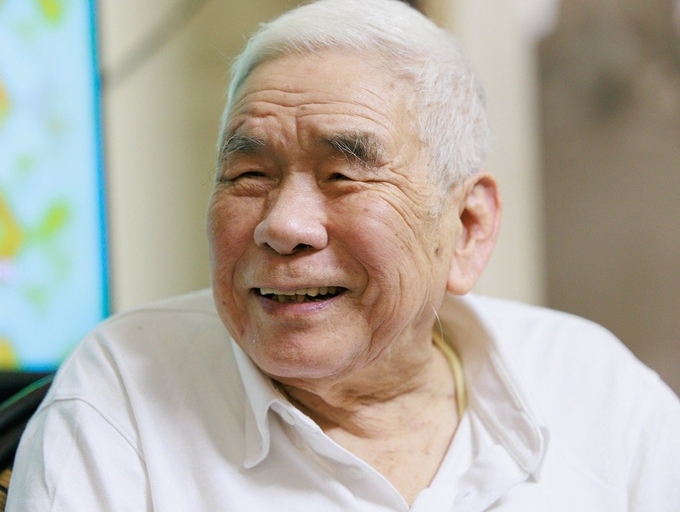
Mr. Doan Trieu Nhan has been recognized for his significant contributions to the coffee industry with the prestigious Labor Medal and the Hero of Labor awards, bestowed upon him during the Renovation period. These honors serve as acknowledgments from the Party and the State. However, the man from Mai Dich village in Hanoi finds immense pleasure in witnessing the vibrant world of Vietnamese coffee and the countless lives connected with it today.
In 1995, the Vietnam Coffee Corporation was founded. Mr. Tran Khai, a former Deputy Chairman of the State Planning Committee, has been appointed as the Chairman of the Board of Directors, while Mr. Doan Trieu Nhan has assumed the role of Vice Chairman. Efforts to support the growth and sustainability of the Vietnamese coffee industry have been put into action in the Northwest region. These initiatives include the implementation of programs focused on replanting, as well as the development of certified coffee production and supervision. Mr. Doan Trieu Nhan drew parallels between the passage of time and significant events that have shaped the remarkable success of the coffee industry today.
As an illustration, the replanting program, which involves replacing inefficient coffee areas spanning approximately 100,000 hectares, reflects the influence of former Deputy Minister of Agriculture and Rural Development Le Quoc Doanh and the Vietnam Coffee-Cocoa Association, led by Chairman Doan Trieu Nhan. Or the community regulations of the 4C Coffee Common Code.Revitalizing coffee plantations while adhering to sustainable coffee production standards.
Almost two decades ago, Mr. Nhan worked alongside the Department of Crop Production and the Institute of Policy and Strategy for Rural Development (IPSARD) as one of the initial supporters of the 4C Coffee Association (now known as the Global Coffee Platform GCP) in Vietnam.
With a strong commitment to promoting sustainable coffee development, GCP Vietnam has made significant contributions to the growth of the coffee industry. They have supported pilot projects to establish regional codes for coffee cultivation in the Central Highlands, developed guidelines for sustainable robusta and arabica coffee production, and created vegetation cover documents to address climate change and reduce herbicide use. Additionally, GCP Vietnam has developed integrated crop management handbooks for coffee trees and collaborated with the International Labor Organization to enhance occupational safety and health in the coffee industry. They have also provided training for coffee producers in the Central Highlands and Northwest, with a focus on encouraging women's participation.
Simultaneously, GCP has partnered with the Plant Protection Department and various international organizations to study the potential hazards of plant protection chemicals that could be transferred to restricted or banned use in coffee-importing nations from Vietnam. This collaboration aims to inform Vietnam about potential solutions to meet the requirements promptly.
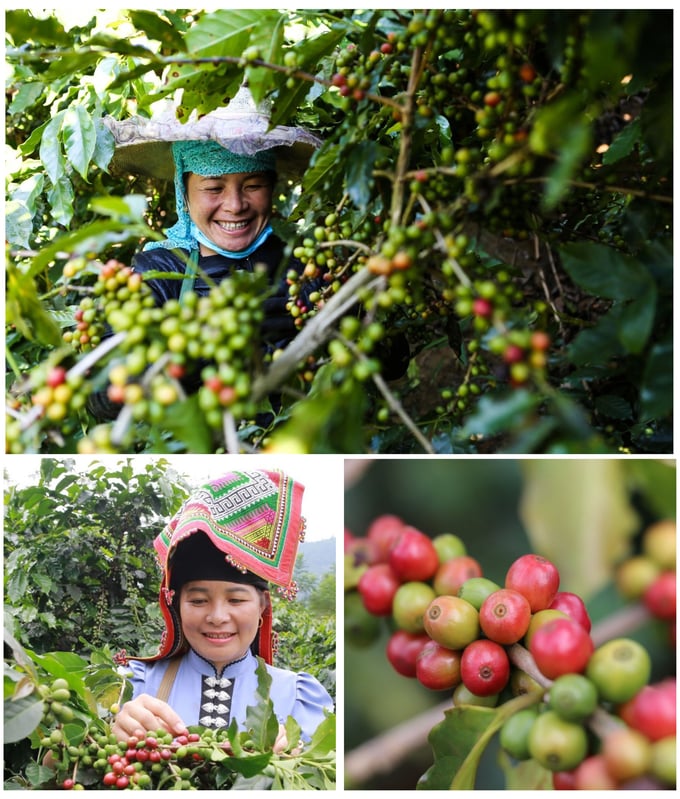
Shortly, GCP Vietnam plans to work closely with select units under the Ministry of Agriculture and Rural Development to establish a comprehensive set of guidelines to reduce coffee production emissions. These guidelines will be designed to minimize costs for coffee producers. GCP will also work with its members including coffee roasters, retailers, sustainable standards, funding agencies, financial institutions, and other stakeholders to continue the goal of increasing income for about 225,000 coffee-producing farmers, contributing to enhancing international integration and sustainable development for the Vietnamese coffee industry.
Reflecting on these stories, Mr. Doan Trieu Nhan takes a smile. "With an export value of over 4 billion dollars now, and more importantly, the immense contribution of the Vietnamese people, it is evident that Vietnamese coffee has a promising future ahead." His smile radiates a sense of accomplishment and humility, coming from someone who has played a pivotal role in shaping the Vietnamese coffee industry for almost fifty years.
Mr. Doan Trieu Nhan, also known as Mr. Coffee, has left a lasting impression on experts in international forums whenever Vietnamese coffee is discussed.
Translated by Linh Linh

(VAN) This was the assessment shared by experts at the workshop titled 'Assessing the Role and Potential of Low-Emission Rice Production Systems in Vietnam,' held on the morning of May 19.

(VAN) Cai Rong Port is the fisheries control center of Quang Ninh, helping to monitor fishing vessels, combat IUU fishing, and remove the EC's 'yellow card'.

(VAN) The German Agricultural Society (DLG) explores the possibility of establishing a mechanization service center in Vietnam’s Mekong Delta to support farmers in accessing and utilizing advanced machinery.

(VAN) On May 16, the Department of Water Resources Management, in collaboration with the Food and Agriculture Organization of the United Nations (FAO), held a signing ceremony for the GEF-8 project document.

(VAN) Food safety, mechanization, vocational training, and market opening are key areas of cooperation expected between the Vietnamese Government and the Federal Republic of Germany.

(VAN) Deputy Minister Nguyen Quoc Tri also expressed his hope that Cuba will soon overcome its current challenges, attain food security, and further expand cooperation with Vietnam.

(VAN) The project contributes to enhancing the resilience of communities vulnerable to the impacts of climate change, with a primary focus on local women.